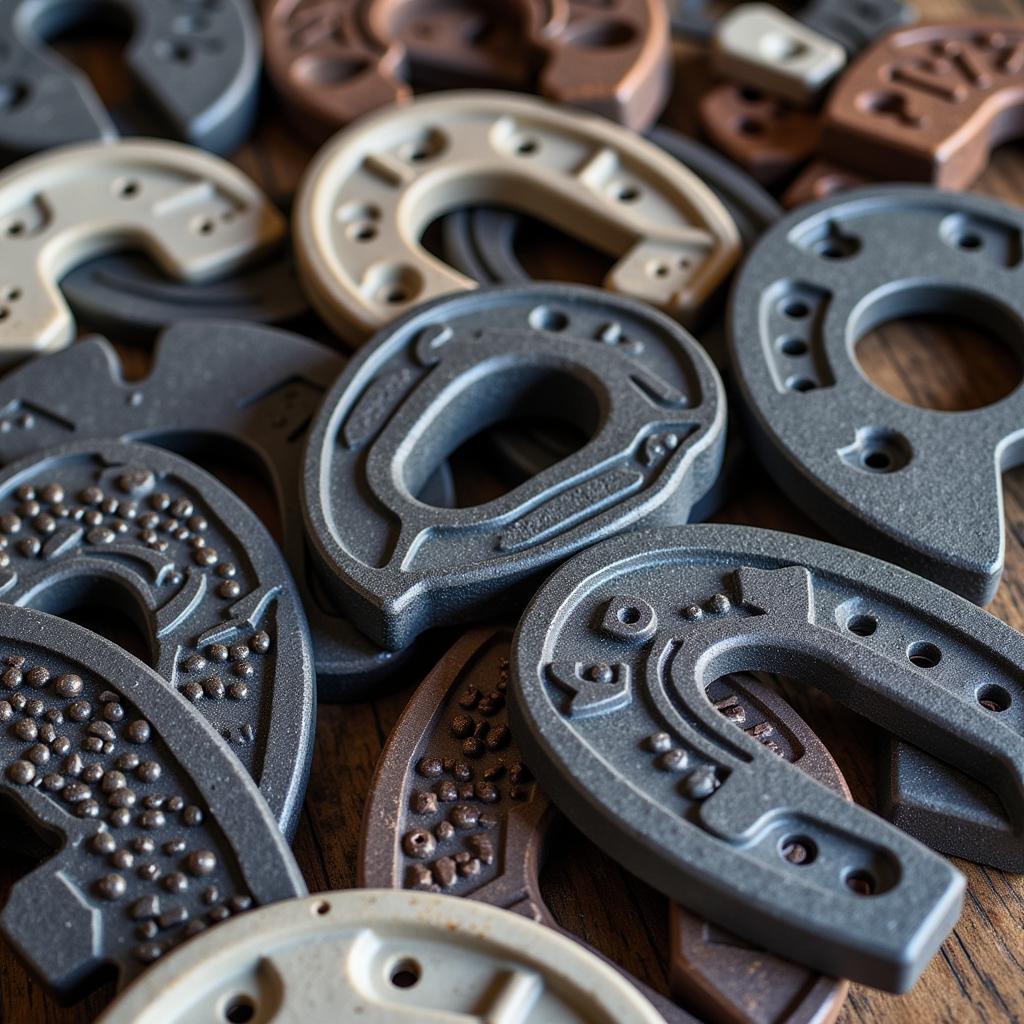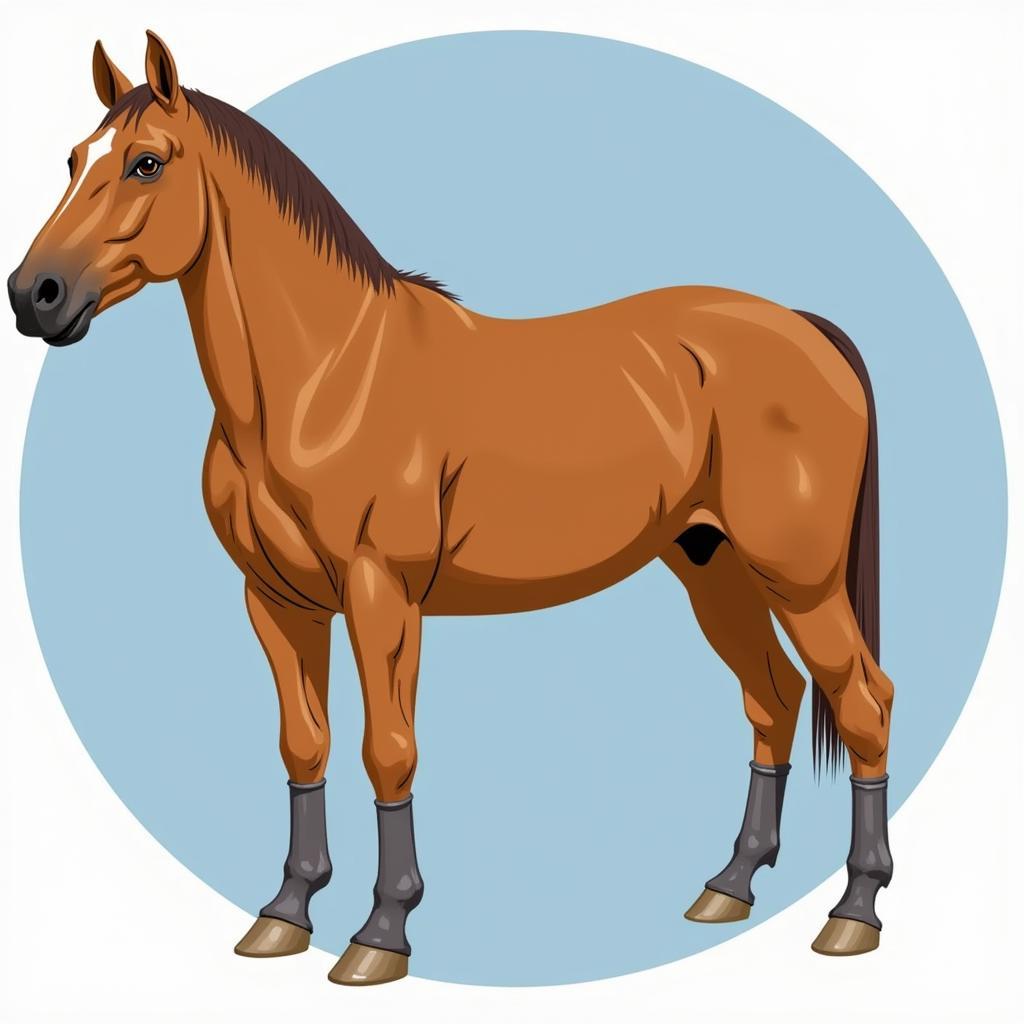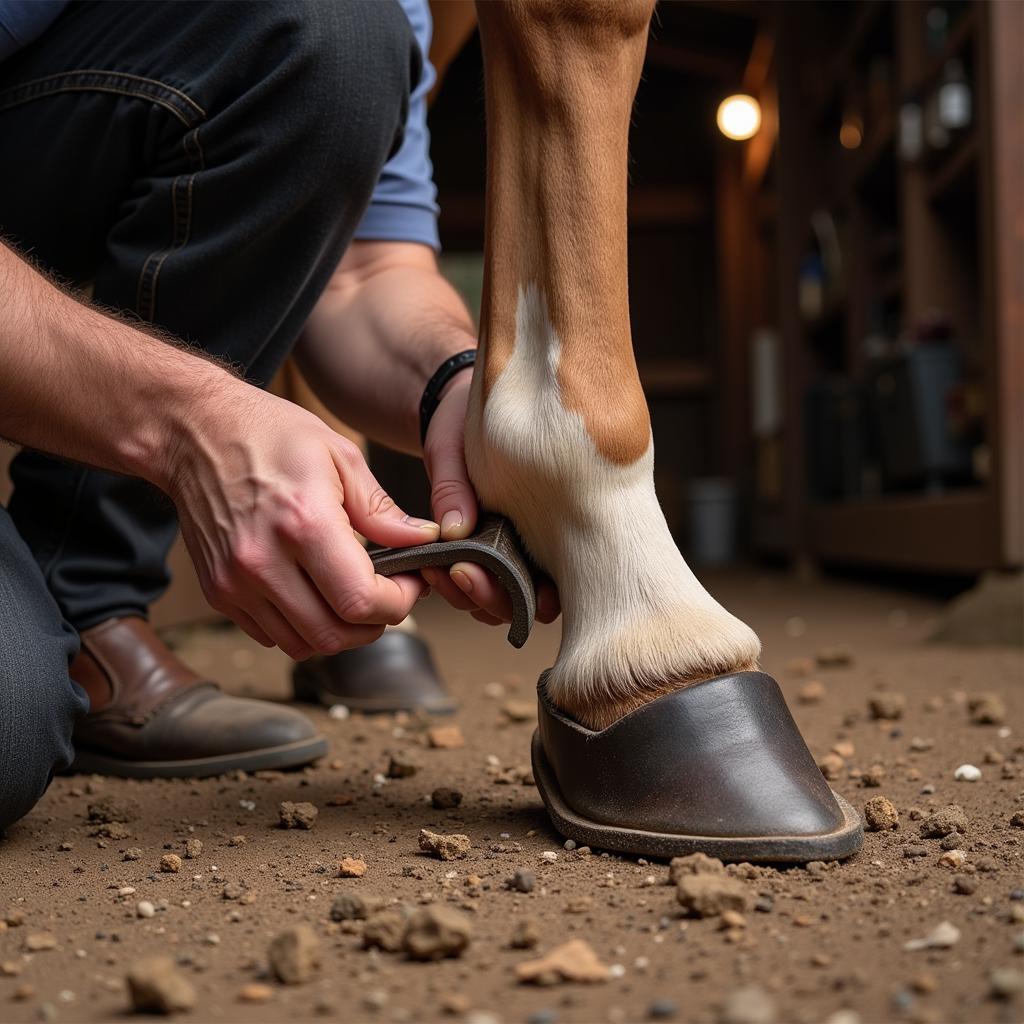Composite horse shoes have exploded in popularity in recent years, offering a compelling alternative to traditional metal shoes. But what are composite shoes, and are they the right choice for your equine companion? This guide delves into the world of Composite Shoes For Horses, exploring their benefits, drawbacks, and everything you need to know to make an informed decision.
Understanding Composite Horse Shoes
 Types of Composite Horse Shoes
Types of Composite Horse Shoes
Unlike traditional metal shoes, composite shoes are crafted from a blend of durable, lightweight materials such as polyurethane, plastic polymers, or rubber. This unique composition gives composite shoes several key advantages:
- Lightweight: Composite shoes are significantly lighter than metal shoes, reducing strain on your horse’s limbs and promoting a more natural gait.
- Shock Absorption: The inherent flexibility and shock-absorbing properties of composite materials can minimize concussion on joints, making them ideal for horses with sensitive hooves or those participating in high-impact disciplines.
- Improved Traction: Many composite shoes feature enhanced tread patterns that provide superior grip on various surfaces, from slick grass to muddy paddocks.
Benefits of Composite Shoes for Horses
 Horse with Composite Shoes
Horse with Composite Shoes
Composite shoes offer a range of benefits that can significantly improve your horse’s well-being and performance:
- Enhanced Comfort: The lightweight and shock-absorbing nature of composite shoes can alleviate stress on tendons and ligaments, making them an excellent option for horses recovering from injuries or those with chronic hoof conditions.
- Increased Blood Flow: Composite shoes allow the hoof to flex more naturally, promoting healthy blood circulation throughout the hoof capsule.
- Reduced Noise: Unlike metal shoes that create a distinct “clinking” sound, composite shoes are remarkably quiet, making them a favorite among riders who prefer a more peaceful riding experience.
- Easy Application: Composite shoes are typically attached using adhesives or a combination of adhesives and nails, simplifying the shoeing process and reducing the risk of nail-related issues.
Drawbacks and Considerations
While composite shoes offer numerous advantages, it’s essential to consider potential drawbacks before making a switch:
- Durability: Composite shoes may wear down faster than metal shoes, particularly in high-wear areas or with abrasive surfaces. Regular assessments by a farrier are crucial to monitor wear and tear.
- Cost: Composite shoes often come with a higher initial cost compared to traditional metal shoes. However, their potential to reduce vet bills and extend shoeing intervals can offset the initial investment over time.
- Not Suitable for All: Composite shoes may not be appropriate for all horses, especially those with specific hoof conditions or those engaged in disciplines requiring maximum hoof protection.
“Every horse is an individual, and what works best for one might not be ideal for another,” says renowned farrier, John Smith. “It’s crucial to consult with your veterinarian and a qualified farrier to determine if composite shoes are the right fit for your horse’s needs and lifestyle.”
Choosing the Right Composite Shoes
 Composite Shoe Fitting
Composite Shoe Fitting
Selecting the appropriate composite shoes involves several factors:
- Horse’s Needs: Consider your horse’s breed, discipline, hoof condition, and activity level.
- Shoe Type: Explore different brands and styles of composite shoes, each offering unique features like varying degrees of flexibility, traction, and durability.
- Farrier Expertise: Seek a qualified and experienced farrier who is knowledgeable about composite shoes and their application.
Caring for Composite Shoes
Proper maintenance can prolong the lifespan of composite shoes:
- Regular Cleaning: Remove dirt, debris, and packed snow from the shoes regularly using a hoof pick and stiff brush.
- Avoid Harsh Chemicals: Refrain from using harsh chemicals or solvents on composite shoes, as they can degrade the material.
- Monitor Wear and Tear: Regularly inspect the shoes for signs of excessive wear or damage, scheduling farrier appointments for replacements or adjustments as needed.
Are Composite Shoes Right for Your Horse?
Composite shoes offer a compelling blend of benefits for horses, promoting comfort, performance, and overall hoof health. While not a one-size-fits-all solution, composite shoes can be a game-changer for many horses. By carefully considering the factors discussed above and consulting with professionals, you can make an informed decision about whether composite shoes are the right choice for your equine partner.
Looking for affordable horse supplies? Check out our wide selection of horse supplies cheap.
Frequently Asked Questions about Composite Horse Shoes
1. How long do composite shoes last?
The lifespan of composite shoes varies depending on factors like the horse’s activity level, terrain, and shoe quality. On average, they can last anywhere from 4 to 8 weeks, sometimes even longer with proper care.
2. Are composite shoes slippery?
Many composite shoes feature specialized tread patterns designed to enhance grip on various surfaces, often providing superior traction compared to traditional metal shoes.
3. Can I ride my horse on all surfaces with composite shoes?
While composite shoes offer excellent traction on most surfaces, it’s essential to consider the specific shoe type and your horse’s needs. Consult with your farrier for recommendations based on your riding discipline and terrain.
4. Are composite shoes suitable for all horses?
Composite shoes may not be suitable for all horses, particularly those with specific hoof conditions or those engaged in disciplines requiring maximum hoof protection. It’s crucial to consult with your veterinarian and a qualified farrier to determine the best option for your horse.
5. Do composite shoes require special care?
Composite shoes are relatively low-maintenance but benefit from regular cleaning and inspections. Avoid harsh chemicals and monitor for signs of wear and tear, scheduling farrier appointments as needed.
Need help organizing your horse tack? Explore our range of practical and stylish horse tack storage solutions.
Need assistance with finding the right composite shoes for your equine companion? Contact our expert team at Phone Number: 0772127271, Email: [email protected], or visit us at QGM2+WX2, Vị Trung, Vị Thuỷ, Hậu Giang, Việt Nam. We have a dedicated customer support team available 24/7 to answer all your questions and guide you toward the best choices for your horse’s needs. We also have a wide range of horse and barn supplies to meet your needs. Don’t hesitate to reach out; we’re here to help you every step of the way.